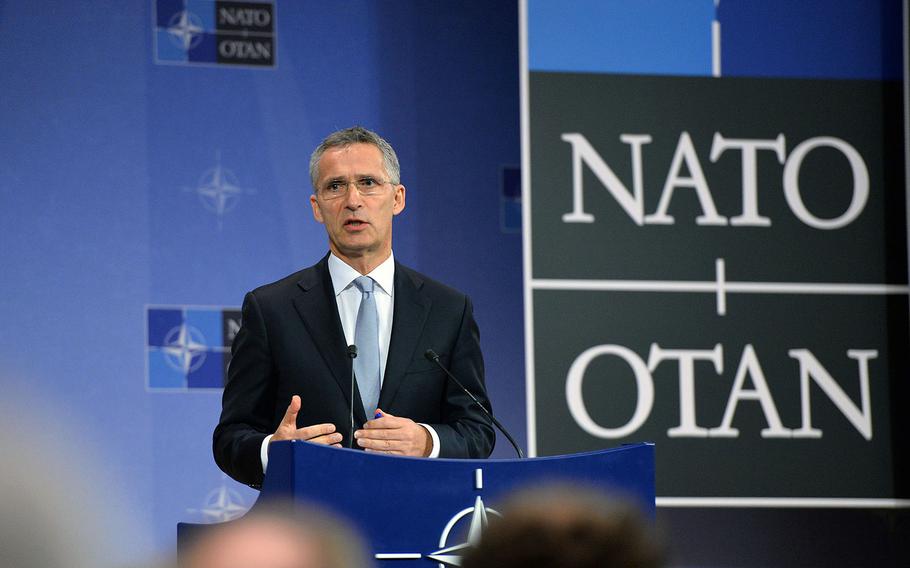
NATO Secretary General Jens Stoltenberg speaks at the alliance's headquarters in Brussels, Belgium, on Tuesday, Oct. 25, 2016. (NATO)
The U.S.-led NATO alliance will detail plans for its enhanced presence in the Baltics and Poland, where a battalion of U.S. Army cavalrymen will be among the forces deploying to NATO’s eastern flank early next year.
“This is credible deterrence,” NATO Secretary General Jens Stoltenberg said Tuesday. “Concrete proof that NATO can and will deploy thousands of forces to support our allies. And a clear demonstration of our transatlantic bond.”
The moves, to be discussed at a two-day meeting of NATO defense ministers in Brussels that opens on Wednesday, come as the Norwegian parliament approved a plan to maintain a steady rotational presence of about 300 Marines near that country’s border with Russia.
“Their decision is certain to galvanize our relationship with the Norwegian Armed Forces and improve our collective capabilities,” Marine Corps Forces Europe’s Maj. Gen. Niel Nelson said.
Together, the measures are part of an evolving effort by allies to enhance its presence in a region where allies are edgy over a more assertive Russia.
Canada, Germany, United Kingdom are set to lead battalions in the Baltic states while the U.S. will operate out of Poland. The force is intended to send a signal of deterrence against Russia, who allies have been at odds with since Moscow’s 2014 intervention in Ukraine.
During the past two years tensions have mounted between east and west. While NATO has taken a series of measures to demonstrate resolve, allies in Europe also have at the times sent mixed signals.
For instance, a Russian naval task force, including the country’s only aircraft carrier and a nuclear-powered battlecruiser, is now en route to the Mediterranean Sea, where NATO has voiced concern that the vessels could be used to intensify airstrikes on the besieged Syrian city of Aleppo. The Russian campaign in Syria has been a source of fierce disagreement between Moscow and Washington, which has accused Russian forces of killing large numbers of civilians.
Still, while Moscow’s mission in Syria has been roundly criticized by Washington, some NATO allies such as Spain are providing critical logistical support to the task force. When asked whether such support was at odds with NATO interests, Stoltenberg said the matter was one for individual nations to consider.
“I believe all allies are aware this battle group can be used to conduct air strikes against Aleppo and Syria,” Stoltenbergtold journalists at the alliance’s headquarters.
During the talks in Brussels on Wednesday and Thursday, NATO defense ministers also will discuss the U.S.-led campaign against the Islamic State group in Syria. While NATO does not have a formal role in combat operations, it has begun surveillance flights from Turkey. The alliance’s Airborne Warning and Control System surveillance planes will fly over international airspace or over Turkey to provide a clearer operations picture of the airspace in Syria.
NATO also plans to step up training of Iraqi officers.
“We have already trained hundreds of Iraqi officers in Jordan — in areas including military medicine and defusing improvised explosive devices,” Stoltenberg said. “And we will expand our support into Iraq itself in the coming month”